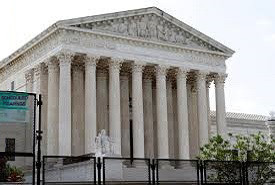As a result of the Spanish American War, the United States extended its administrative authority over the overseas areas of Guam, the Philippines, Puerto Rico, and Cuba. Since 1901, the US Supreme Court has issued numerous rulings which have held that inhabitants of overseas territories or overseas areas are only guaranteed certain "fundamental rights" under the US Constitution. The Justices have described these as "inherent principles which are the basis of all free government."
The major justification for this "differing treatment" has been that, generally speaking, these localities have "wholly dissimilar traditions and institutions, religious and social practices, as well as tax and regulatory codes.
These so-called "fundamental rights" appear to correspond roughly to the "natural rights" earlier described by Justice White☆, in a concurring opinion in Downes v. Bidwell, 182 U.S. 244 (1901). Among these "natural rights", (which numerous Justices have described as "inherent principles which are the basis of all free government"), Justice White included the right to one's own religious opinion as well as "the right to personal liberty and individual property; to freedom of speech and of the press; to free access to courts of justice; to due process of law and to an equal protection of the laws; to immunities from unreasonable searches and seizures, as well as immunities from cruel and unusual punishments . . . . . "
U.S. Constitutional governance
In regard to the application of the U.S. Constitution in overseas areas under U.S. jurisdiction, the U.S. Supreme Court has also continually held that the "liberty" of the Fifth Amendment includes the right to travel, and that the right to travel includes the right to obtain a passport ("travel document"). For areas under USMG jurisdiction, such a passport would of course be issued by U.S. military authorities.
It is also commonly recognized that asylum and refugee matters are handled by the U.S. federal government.
Another important stipulation is that Congress will provide for the common defense (U.S. Constitution -- Art. I, sec. 8, cl. 1). None of the pre-existing five major insular areas (Guam, Northern Mariana Islands, American Samoa, Puerto Rico, and the U.S. Virgin Islands) have their own Ministry of National Defense, or have they instituted military conscription laws over their local populace. All defense matters for the fifty states, territories, and areas under U.S. administrative authority are handled by the Department of Defense in the Pentagon.
Such an interpretation is easily confirmed by examining the history of Cuba and the Ryukyu islands. During the period of United States Military Government (USMG) jurisdiction over Cuba (July 17, 1898 to May 20, 1902) and the Ryukyu Island group (Sept. 7, 1945 to May 15, 1972), it was also true that all defense matters for these islands were handled by the Department of Defense or its predecessor, the Dept. of War. This is the established precedent.
For overseas areas under U.S. jurisdiction (insular areas), fundamental constitutional rights (or obligations) are not interpreted to include the following:
 Voting in U.S. federal elections Voting in U.S. federal elections
 Voting in U.S. state elections Voting in U.S. state elections
 Payment of U.S. federal income taxes Payment of U.S. federal income taxes
 Ownership of a gun or other lethal weapon Ownership of a gun or other lethal weapon
 etc. etc.
Note: Although the establishment of a jury system by the local courts would not be "automatic," the stipulations regarding such a system could be included in the local constitution if desired.
Insular areas under the jurisdiction of the United States do maintain a high degree of autonomy, and can establish their own legal system. The U.S. federal government does not insist on the full implementation of the following legal frameworks that are common in the fifty states:
 Labor Policies Labor Policies
 Health Care Laws Health Care Laws
 Social Welfare system Social Welfare system
 Social Insurance system Social Insurance system
 Pension system Pension system
 Environmental Regulations Environmental Regulations
 Financial Supervision system Financial Supervision system
 Local Language Teaching Policies Local Language Teaching Policies
 Education System Structure Education System Structure
 Building Codes and Zoning Laws Building Codes and Zoning Laws
 Professional Licensing Requirements Professional Licensing Requirements
 Maritime and Shipping Regulations Maritime and Shipping Regulations
 Cultural Heritage Protection Laws Cultural Heritage Protection Laws
 Agricultural Policies Agricultural Policies
 Tourism Management Tourism Management
 Public Transportation Systems Public Transportation Systems
 Utilities Management Utilities Management
 Local Government Structure Local Government Structure
 Property Rights and Land Use Property Rights and Land Use
 Business Registration Requirements Business Registration Requirements
 Homelessness Relief Policies Homelessness Relief Policies
 Cost-Sharing and Matching Funds Programs Cost-Sharing and Matching Funds Programs
 Complete Regulations of the U.S. Food and Drug Administration (FDA) Complete Regulations of the U.S. Food and Drug Administration (FDA)
☆ Edward Douglass White Jr. (Nov. 3, 1845 – May 19, 1921), was an American politician, jurist, and member of the Senate. He served on the U.S. Supreme Court beginning in 1894, and was the ninth Chief Justice from 1910 to 1921.
|
|



